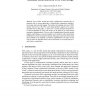Free Online Productivity Tools
i2Speak
i2Symbol
i2OCR
iTex2Img
iWeb2Print
iWeb2Shot
i2Type
iPdf2Split
iPdf2Merge
i2Bopomofo
i2Arabic
i2Style
i2Image
i2PDF
iLatex2Rtf
Sci2ools
104
click to vote
AI
2003
Springer
2003
Springer
Hybrid Randomised Neighbourhoods Improve Stochastic Local Search for DNA Code Design
Sets of DNA strands that satisfy combinatorial constraints play an important role in various approaches to biomolecular computation, nanostructure design, and molecular tagging. The problem of designing such sets of DNA strands, also known as the DNA code design problem, appears to be computationally hard. In this paper, we show how a recently proposed stochastic local search algorithm for DNA code design can be improved by using hybrid, randomised neighbourhoods. This new type of neighbourhood structure equally supports small changes to a given candidate set of strands as well as much larger modifications, which correspond to random, long range connections in the search space induced by the standard (1-mutation) neighbourhood. We report several cases in which our algorithm finds word sets that match or exceed the best previously known constructions.
| Added | 06 Jul 2010 |
| Updated | 06 Jul 2010 |
| Type | Conference |
| Year | 2003 |
| Where | AI |
| Authors | Dan C. Tulpan, Holger H. Hoos |
Comments (0)

